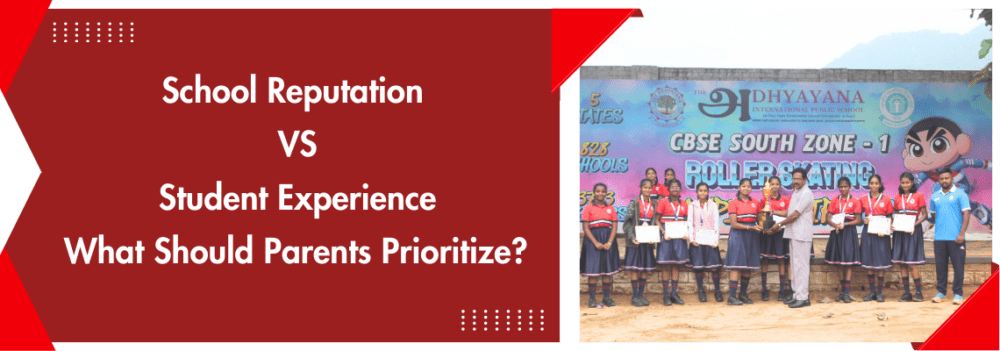As parents, one of the most important decisions you’ll ever make for your child is selecting the right school. In today’s competitive educational landscape, many parents often find themselves torn between choosing a school based on its reputation or focusing on the actual student experience it provides. The decision is never easy, and both factors—school reputation and student experience—play a crucial role in shaping your child’s future. But what should parents really prioritize when making this critical choice?
In this article, we’ll explore the key differences between school reputation and student experience, and discuss which of these factors parents should give more weight to when choosing the best school for their children.
Understanding School Reputation
School reputation refers to how a school is perceived by the public, based on factors such as academic performance, extracurricular offerings, and overall prestige. Reputation is often built over time and is influenced by a variety of external factors, including alumni success, media coverage, and rankings in educational surveys. A school with a strong reputation is typically seen as a top choice, with many parents assuming that a well-regarded school automatically translates to a superior educational experience.
However, while a good reputation can be a positive indicator of quality, it is not always a guarantee of the best environment for every child. School reputation is based on external perception, which may not always reflect the realities of daily student life. This is where the distinction between school reputation and student experience becomes critical.
What Defines a Positive Student Experience?
Student experience refers to the actual day-to-day environment in which a child learns, grows, and interacts. This includes everything from classroom teaching, teacher-student relationships, extracurricular opportunities, and peer interactions, to the overall school culture. A positive student experience is one where the child feels supported, engaged, and motivated to succeed—not just academically, but socially and emotionally as well.
A focus on student experience ensures that children have the tools and support they need to thrive, regardless of the school’s reputation. Schools that prioritize student well-being often foster environments where students can express themselves, explore their interests, and build the critical thinking skills they need for life beyond the classroom.
The Influence of School Reputation on Parental Choices
Many parents naturally gravitate towards schools with high reputations, believing that a prestigious institution offers the best chances for their child’s success. This mindset often stems from societal pressures, where a school’s reputation is seen as a marker of quality education and a ticket to future opportunities.
Schools with strong reputations often have a history of high academic achievement, a robust alumni network, and excellent facilities. Parents may view these schools as safer choices, assuming that a good reputation guarantees academic success. While school reputation can certainly open doors, relying solely on this factor can sometimes overlook other aspects of a child’s holistic development, such as emotional well-being, social skills, and individual learning needs.
Why Parents Shouldn’t Overlook Student Experience
While school reputation can provide a general indication of a school’s success, the student experience offers a more accurate picture of how a child will thrive in that environment. A well-regarded school might have high academic standards, but if the child does not feel engaged or supported, it can negatively affect their overall growth and happiness.
A focus on student experience emphasizes the importance of personalized learning, emotional support, and fostering a love of learning. Schools that prioritize student experience often create a nurturing environment where children are encouraged to think critically, collaborate with peers, and pursue their passions. The experience a student has within the school can profoundly impact their academic success, confidence, and sense of belonging.
Key Factors to Consider in Student Experience
When evaluating student experience, there are several important factors that parents should consider:
- Teacher-Student Relationships

The quality of the teacher-student relationship is one of the most critical elements of a positive school experience. Teachers who genuinely care about their students’ well-being and success can have a significant impact on their motivation and engagement in school. Supportive teachers create an environment where students feel comfortable asking questions, taking risks, and developing their skills.
- Extracurricular Activities
A well-rounded student experience includes more than just academics. Extracurricular activities such as sports, arts, and clubs allow students to explore their interests and develop important life skills like leadership, teamwork, and time management. Schools that offer a diverse range of extracurriculars often provide richer, more fulfilling experiences for students.
- School Culture and Environment
The overall school culture plays a significant role in shaping the student experience. A positive and inclusive school culture fosters a sense of belonging and encourages students to support one another. Schools with a strong emphasis on respect, diversity, and community often create a more welcoming and engaging environment for all students.
- Support for Individual Learning Needs
Every student has unique learning needs, and schools that provide personalized support can greatly enhance the student experience. Whether through special education programs, gifted and talented opportunities, or individual attention from teachers, schools that cater to the diverse needs of their students ensure that everyone has the opportunity to succeed.
Striking a Balance: Reputation vs. Experience
So, what should parents prioritize? The answer lies in striking a balance between school reputation and student experience. While a school’s reputation can provide some insight into its academic standing, parents must also dig deeper to understand what kind of experience the school offers on a day-to-day basis.
It’s important to visit schools, speak with teachers, and talk to current students and parents to get a true sense of what the student experience is like. In some cases, parents may find that a school with a less prestigious reputation offers a more supportive and nurturing environment for their child. On the other hand, a well-regarded school with a strong reputation may provide the resources and opportunities needed to excel.
Ultimately, the best choice is one that aligns with your child’s individual needs, interests, and personality. The most prestigious school may not always be the best fit, and the most important factor should always be your child’s happiness and well-being.
Why Student Experience Should Take Priority
While school reputation is often the first factor parents consider, the student experience should take priority. A school that fosters a positive and inclusive environment where students feel valued and supported can make a significant difference in a child’s development. Education is not just about academic success; it’s about preparing students for life beyond the classroom.
A great student experience will equip children with the skills they need to face challenges, build relationships, and pursue their passions. Parents should remember that a school’s reputation may open doors, but it’s the student experience that shapes a child’s future.
Choosing What Matters Most
When it comes to selecting the right school for your child, parents are often faced with the dilemma of choosing between school reputation and student experience. While a prestigious school might have its advantages, it is the actual experience your child has within the school that will determine their success, happiness, and personal growth.
Ultimately, parents should prioritize a balanced approach—considering both the school’s reputation and the day-to-day experiences it offers students. Visiting schools, interacting with staff, and understanding how your child fits within the school’s culture can help make the best decision for their future.


